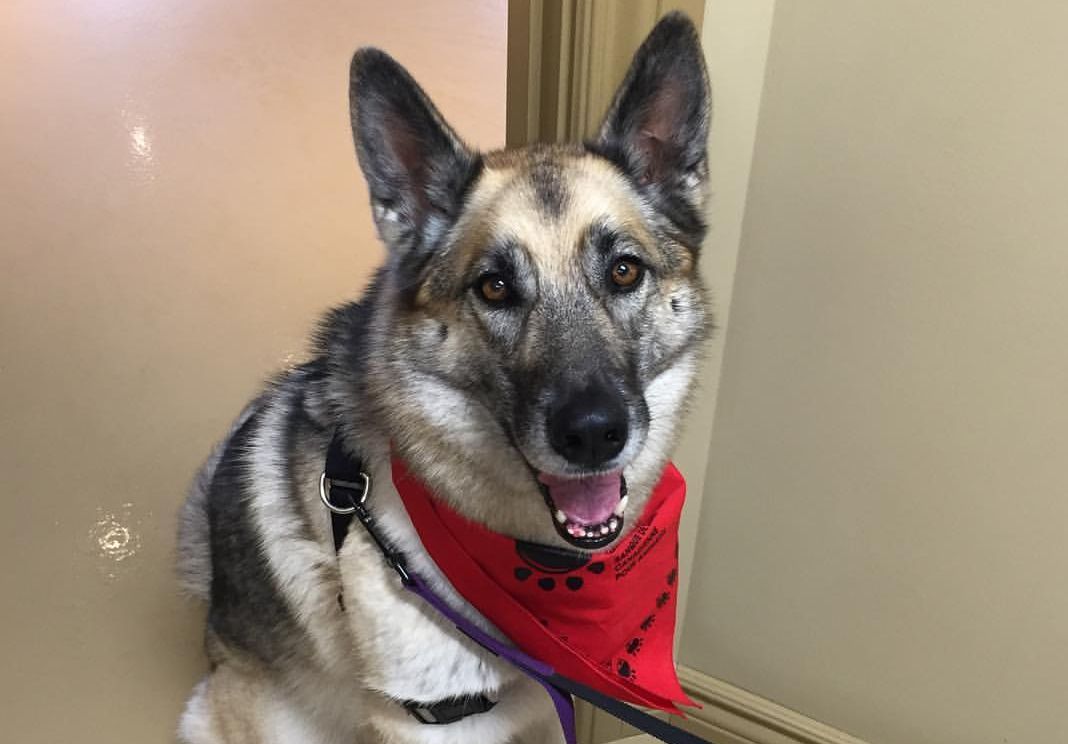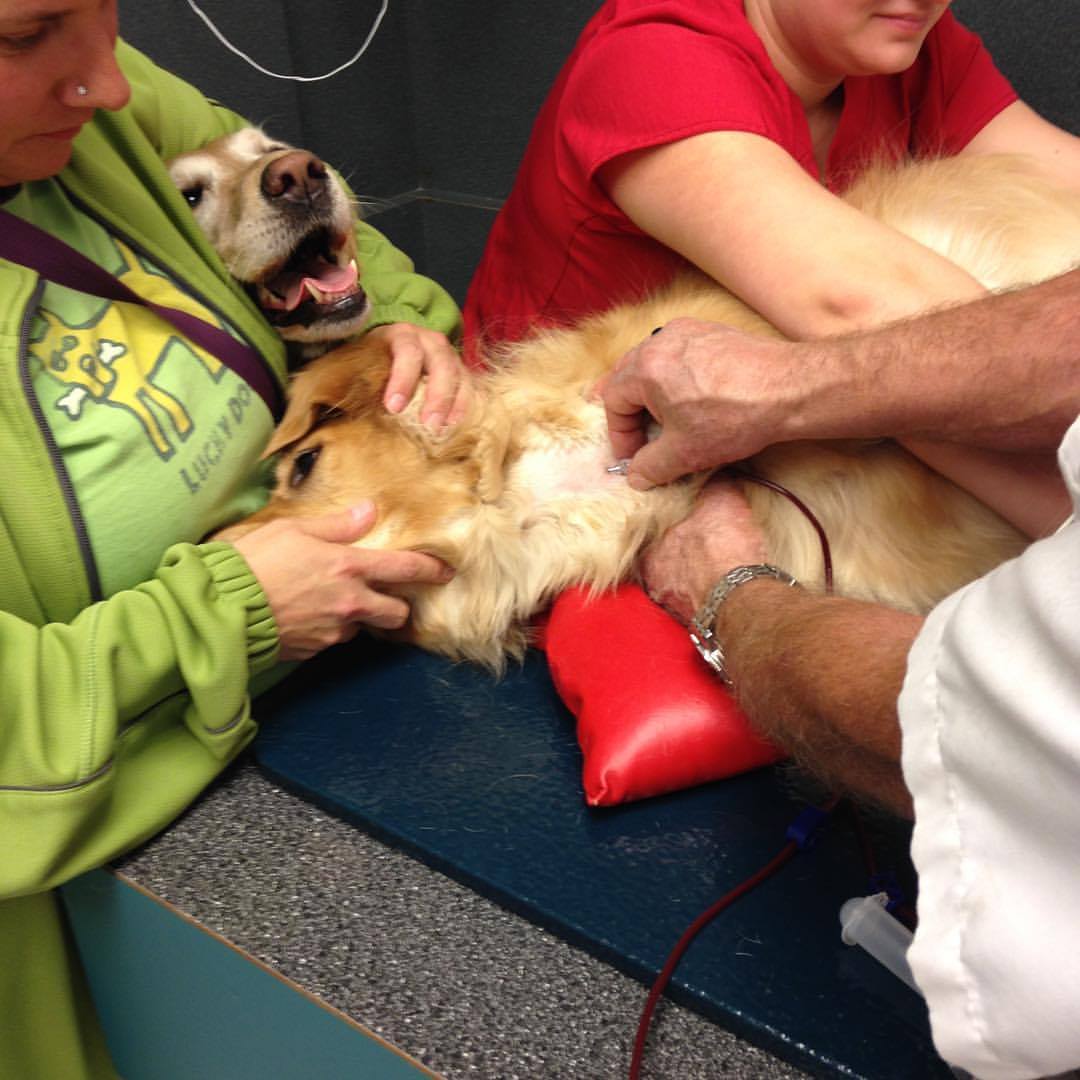The Canadian Animal Blood Bank (CAAB) says it’s in need of canine donors to help keep their reserves up. Much like how Canadian Blood Services exists for people, the CAAB is a non-profit organization that supplies canine blood to Canadian veterinarians.

READ MORE: Dog blood donors: yes, they’re a real thing
“Same as with humans — dogs need blood products, too,” said CAAB donor recruitment director Mary Robinson, who is also a registered vet tech.
“They could get into an accident, their protein levels could deplete, they could eat some rat poison.
“You never know when your pet is going to require a blood transfusion and these donors and their owners who come in and volunteer their time, they’re saving a life. They don’t have to do this.”
The organization is based in Winnipeg, where collected blood is processed and stored, but it has collection sites in Toronto, Calgary and Edmonton as well.
READ MORE: Canadian Animal Blood Bank in need of doggy donors
“There is always a need for canine blood donors, the reason is that, obviously, dogs don’t live as long as people, right? You can get some people that donate you know 50, 60 times because they live a lot longer than dogs do,” Robinson said.
- Gas prices in Ontario, Quebec to jump to highest level in 2 years: analyst
- Shoppers faces proposed class action over claims company is ‘abusive’ to pharmacists
- ‘Bacterial vampirism’: Deadly pathogens attracted to human blood, study finds
- What’s going on with the Cybertruck? Tesla seems to have halted deliveries
Each donation can help two other dogs.
Who can donate?
Healthy dogs need to be at least 55 pounds or 25 kilograms, one to eight years old, are up to date with their vaccinations and have an even temperament to be candidates for donation. Some large breeds, such as Great Dane or Mastiffs, need to wait longer to donate because they are not yet fully grown after a year.
“And every new donor has to have a donor registration form filled out by their primary veterinarian — it only has to happen once — it’s just for us to determine whether or not the dog is indeed healthy and meets the criteria. The vet practices are usually the best ones. They know the types of dogs we are looking for.”
What is the donation process?
The process is very similar to the one a human goes through when donating blood.
It takes about 20 minutes start to finish, but most of the time is spent on prep and paperwork. Upon arrival, dogs are weighed, a sample is taken to test for packed cell volume and total protein levels, and a photo is taken to post on social media.
The owner will be asked a few questions to make sure the dog hasn’t been sick or taken any recent medications which would disqualify them from donating.
If everything is good, the dog is put on the exam table and the owner is showed how to help hold the dog’s head so the process goes smoothly.
“This is to allow good blood flow from the jugular vein. It’s kind of like a garden hose, if the jugular is not nice and straight it will kink off and you won’t get any blood flow.”
A small area is swabbed and the needle inserted. The actual donation only takes a few minutes, during which time 450 to 500 millilitres of blood are collected.
Afterwards, pressure is applied for a few minutes to allow the area to clot, and the owners are showed how to prevent the site from opening up again.
Perks for dogs who donate
Dogs who are eligible can donate every three months, and those who give can also receive blood in return, should they ever need it.
“They get a blood product on a one-for-one basis. So we’ve had some dogs in Manitoba that have donated over 30 times, so those dogs, should they ever need it, have 30 units of blood, should they ever require it,” Robinson explained, adding while the actual blood is free the owner still has to pay for the transfusion process.
WATCH: The importance of canine blood donations
Other perks for donor dogs include a microchip after their second donation if they don’t already have one. As well, during every donation, a sample is sent away to be tested for eight bacterial tick-borne diseases.
“This is done every single time they come in because if they come back positive, unfortunately, they can’t be a donor anymore. It’s transmissible in a blood product.”
Why should my dog donate?
Robinson said the process doesn’t hurt the dogs and it doesn’t shorten their lifespan — the biggest misconceptions she faces. She’s inserted needles into over 3,000 dogs and rarely do they make a fuss.
“I’ve had one or two dogs that kind of go, ‘Dude, what are you doing with my neck?’ but the rest of them they don’t even flinch when you insert the needle.
“We keep this as stress-free as possible, there’s lots of treats, lots of love, and if in any way shape or form the animal is too overly stressed, we just stop. It’s not worth it for us to stress an animal out. So if they’re on the fence about it, just give it a shot. Just attend one clinic, even if you wanted to just stop by and see the process, that’s not a problem — we don’t mind.”
Clinics in Edmonton and Calgary
Currently, in the Edmonton area, there is a donor clinic at NAIT— run by students in the Animal Health Technology program — one Saturday and Monday evening a month while school is in. There is usually one clinic during the summer break as well.
READ MORE: Furry friends needed at Edmonton animal blood bank
Starting in January, Guardian Veterinary Centre in south Edmonton also began running monthly clinics. Tudor Glen Veterinary Hospital in St. Albert also runs a clinic once every three months.
The next blood donation clinic at NAIT’s Animal Health Clinic is on Saturday, April 7, from 8 a.m. to 4 p.m (the first appointment is at 8:30 a.m.; the last is at 3:30 p.m.)
Those interested in donating are asked to make an appointment with CABB, by emailing cabb@outlook.com or calling 204-632-2586.
Why not cats?
The organization doesn’t do feline donations because “cats are reluctant donors” who often have to be sedated during a donation, and do not require blood transfusions as often as dogs. CABB also doesn’t have the ability to process or store feline donations. When they do need blood, vets will often bring a donor cat into their clinic to do the transfusion.
Robinson said the CABB is always grateful to dog owners who sign up for the process.
“This is a completely volunteer process and it’s so important because without these donors, we couldn’t do what we do. We wouldn’t be able to supply 50 to 60 units of blood every single week, 365 days a year to veterinary practices all over Canada.”
Editor’s Note: This story was first published in December 2017, and updated with the latest clinic date on April 6, 2018.










Comments